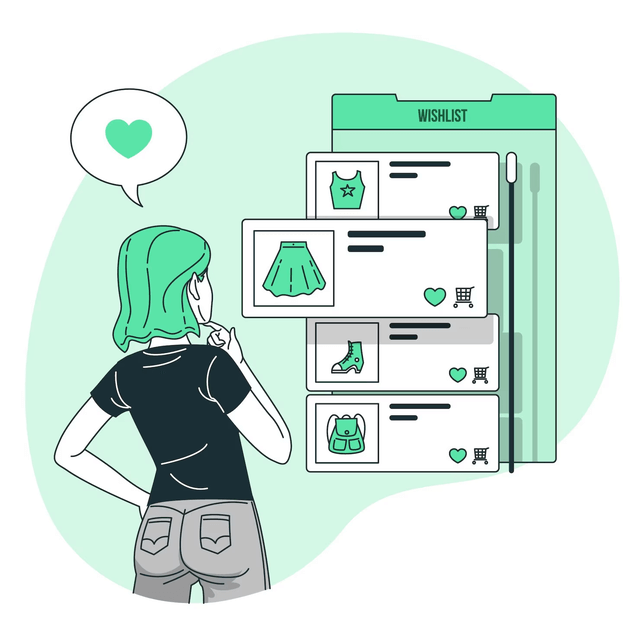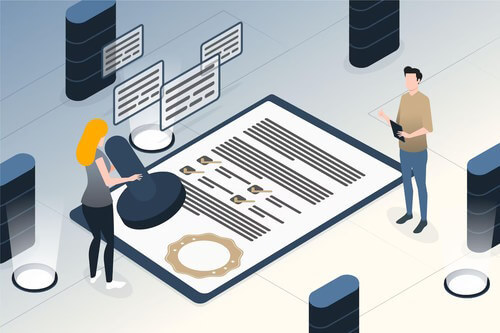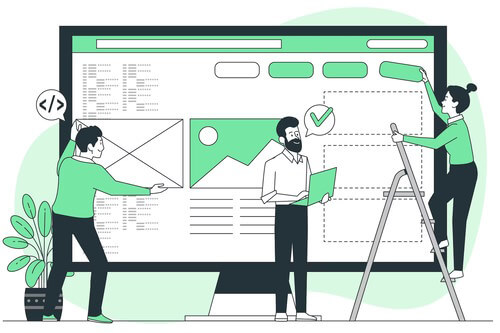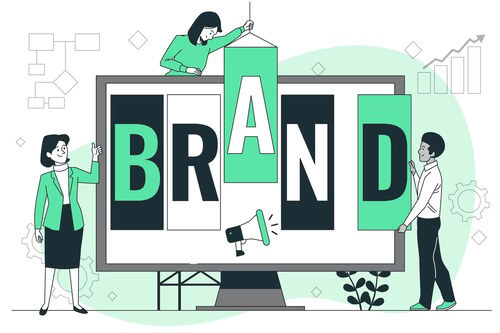Getting started in E-Commerce can seem like a big job, but the truth is that with planning any business with products can sell successfully online.

E-Commerce is constantly growing in Ireland. As of 2023 over €6 billion is spent each year by Irish consumers and by 2027 that figure is expected to increase to €9.5 billion. While much of that is going overseas the share of Irish businesses taking a serious approach to E-Commerce is increasing meaning more money staying in the Irish economy. If you’re considering starting an E-Commerce business we have all the details you need here.
Research
Choosing Your Industry and Products
Choosing the right industry and product is the foundation of any successful e-commerce business. There are several starting points you can choose to begin at.
Identifying a market gap or a problem that you yourself have faced, and then research the demand and competition for products that can solve that problem. If you have experienced a problem that no one else could solve it’s likely that other people would have faced that exact same problem. You could also ask family and friends as a basic form of market research.
Consider your own interests and expertise when choosing a niche, as it will be easier to market and grow your business if you’re passionate about what you sell. If you have a hobby or interest that you feel has a large enough user base to support a business you’ll likely have knowledge of what customers like you want and need giving you a great start. Knowing the community also means that you’ll have a great insight into how to market to them.
Using your own work experience is another strong avenue to pursue. If you’ve been working for several years you’ll have a wealth of knowledge of your industry, how it works, what customers want and how to operate successfully in that area. Now you can use that as a platform for your own business.
Conduct Market Research

Conducting market research is crucial to understanding your target audience and competitors. Start by identifying your ideal customer and their needs and preferences, and then how you can fill that need. Understanding your customers and who they are is a vital part of setting up any marketing plan. For some companies they will only need one customer profile if the market is a narrow fit, for example a plumbing supplies company that supplies independent plumbers in the local area. Other companies will have several different customer bases that all must be considered, supermarkets for example need to cater to several different age profiles and lifestyles in order to maximise their revenue.
Analyze the market demand and trends: Is the industry growing, shrinking or maintaining a solid base over a number of years? Growing markets offer obvious opportunities to add a new supplier into the mix and possibly to establish yourself as a name in the market. Mature markets can leave a place for new businesses to come in and offer something new, particularly if the established companies are stagnating and not innovating. Whereas shrinking markets should generally be avoided as competition among the existing players for market share will be fierce.
Once you have this information you can then, if budget and time allow, do some proper market research and speak to your potential customers and see what their thoughts and feelings on your proposed business and pricing structure are. If you do this it is vital that you take their feedback on board and not disregard it because it doesn’t fit with what you expected. Even at this stage you still have the opportunity to re-assess, pivot or avoid the trap of continuing down the wrong road.
Business Plan

A well-written business plan is essential to the success of your e-commerce business. It should outline your business objectives, strategies, financial projections, and operational processes. A good business plan will help you secure funding, make informed decisions, and stay focused on your goals.
Financial projections are one of the most important parts of this process. Most new companies in Ireland (and across the world) don’t fail because they can’t make a profit, they fail because of cash flow issues. Many businesses that close in their first year are in the unfortunate position of showing a profit on paper, but because they couldn’t keep the money on hand to pay their bills and suppliers were forced out of business. If you can’t work in some slack in your business projections to account for unforeseen costs or slow payment on sales then it’s going to be very difficult and stressful to keep the business afloat.
Funding Sources
Sourcing funding for your initial start up might come from some places you hadn’t considered. While your own funds are always available there should be some serious consideration given to other methods.
Partner(s): While it can be an attractive idea to go it alone, reap 100% of the benefits and answer to no one this is not always the best option. The old adage “If you want to go fast, go alone. If you want to go far, go together” can apply. Partners can not only offer capital and working cash to operate the business with, they can also add new perspectives, halve the work commitments and be a valuable sounding board for your own ideas.
Government Grants: Local Enterprise Offices are a great resrouce for SME’s and offer several grants to set up and grow your business. Micro Finance Ireland also offers loans to businesses with less than 10 employees and sole traders. If you feel you have a business that could be a fast growing and high value company Enterprise Ireland can offer a range of supports.
Private Grants: There are a few private grants for new companies particularly companies looking to improve their online presence. These can also be paired with government grants at the same time allowing you to reduce costs further.
Business Formation
Choosing a Business Structure
There are several business structures that businesses in Ireland can have, and each one has its own benefits and drawbacks. The three most common structures are sole trader, partnership and limited company.
A sole trader is the simplest structure, with only one owner who is personally responsible for all debts and liabilities. It’s easy to set up, but it also means that there’s no legal distinction between the business and its owner. This means that the owner’s personal assets may be at risk if the business gets into financial trouble.
A partnership is similar to a sole trader, but with two or more owners who share profits, losses, and responsibilities. Each partner is personally liable for the partnership’s debts, which can make it difficult to manage and may lead to disputes between partners.
A limited company is a separate legal entity from its owners, and shareholders have limited liability for its debts and liabilities. This structure requires more paperwork and legal obligations, but it offers greater protection for the owners’ personal assets and can make it easier to attract investors.
Registering a Business

Registering a business in Ireland is a straightforward process. The first step is to choose a business name and check its availability. Then, you will need to register your company with the Companies Registration Office (CRO) and obtain a Tax Registration Number (TRN) from the Revenue Commissioners. You can do this online or by mail, but it’s always a good idea to consult with a solicitor or accountant to make sure you’re following all the legal requirements.
Registering your business is a legal requirement but it does provide some benefits. Firstly, it gives your company a professional image, and customers are more likely to trust a registered business. Secondly, it protects your personal assets and limits your liability in case of any legal issues or debts. Finally, registering your business makes it easier to secure funding and partnerships.
Registering for VAT
As your e-commerce business continues to grow, you need to ensure they comply with tax laws and regulations. In Ireland, if you’re selling goods or services online, you may need to register your e-commerce company for Value Added Tax (VAT). VAT is a tax on the value added to goods and services at each stage of production and distribution.
If your e-commerce company is selling goods or services to consumers in Ireland, and your annual turnover exceeds the VAT registration threshold (€37,500 annual turnover for services or €75,000 for products), then you are required to register for VAT. If your annual turnover is below this amount, then VAT registration is voluntary.
It’s important to note that if your e-commerce company is based outside of Ireland, but you are selling goods or services to Irish consumers, you are still required to register for VAT if your annual turnover exceeds the VAT registration threshold.
Once you’ve registered for VAT, you’ll need to charge VAT on your goods or services and file regular VAT returns. Your VAT returns will show how much VAT you’ve charged and paid, and how much you owe or are owed by the Revenue Commissioners.
To register for VAT in Ireland, you’ll need to provide details about your business, such as your business name, address, and VAT number. You’ll also need to provide details about your turnover and the goods or services you sell. Once you’ve registered, you’ll receive a VAT number that you must include on all your invoices and communications.
Website
Domain Name
Choosing a domain name for your business can be a crucial decision. It’s essential to pick a domain name that’s easy to remember, relevant to your business, and available. If you’re operating in Ireland, getting a .ie domain name can be an excellent choice as it signifies that your business is based in Ireland and can help build trust with your Irish customers.
If you plan to operate internationally or want to protect your brand globally, getting a .com or .eu domain name at the same time can be a good idea. A .com domain is the most popular and recognized domain extension globally, while a .eu domain can be a great option if you’re planning to operate in the European Union. A .co.uk is also an option if you see an opportunity to operate in Northern Ireland or the rest of the UK. Whatever domain name you choose, make sure it’s easy to remember, relevant, and available to secure your online presence.
Building Your Website

Your website will be the cornerstone of your E-Commerce business. Without a brick and mortar location it will be the way you build your reputation and showcase your products.
If you are looking for more information on how to build the right e-commerce site for your business we have an article right here: https://revelate.ie/web-design/web-design-where-to-start/
Or you can contact us to discuss.
Payments Online
Online payment solutions are platforms that allow businesses to accept payments online. These solutions work by facilitating transactions between the buyer, seller, and the payment processor. When a customer makes a purchase online, they enter their payment details into the payment solution, and the solution securely transfers the funds from the buyer’s account to the seller’s account. This process is fast, efficient, and secure, making it an essential part of any e-commerce business.
In Ireland, there are several options available for businesses looking for online payment solutions. The first is Stripe, a popular payment solution used by many e-commerce businesses worldwide. Stripe offers a simple integration process, competitive fees, and support for multiple currencies. The downside of Stripe is that it can take up to seven days for funds to become available in your account.
The second option is PayPal, which is also widely used by businesses globally. PayPal offers fast transactions, a user-friendly interface, and support for multiple currencies. However, PayPal’s fees can be relatively high, and there have been reports of account freezes and disputes which can drag on for months while PayPal holds your money in their accounts. For these reasons PayPal are not recommended by Revelate.
Finally, there’s WorldPay Payments, an Irish-based payment solution. WorldPay offers secure transactions, competitive fees, and a user-friendly platform. In conclusion, choosing the right online payment solution for your business in Ireland is essential. Stripe, PayPal, and WordlPay are three popular options available, each with their strengths and weaknesses. It’s crucial to consider your business needs, the fees, and the integration process before deciding on an online payment solution.
Shipping Partners
When it comes to picking a shipping partner for your business, there are several important considerations to keep in mind:
- Delivery speed and reliability: Customers expect fast and reliable delivery, so it’s essential to choose a shipping partner that can deliver your products quickly and consistently.
- Shipping rates: Shipping costs can eat into your profits, so it’s crucial to find a shipping partner that offers competitive rates.
- Shipping options: Your customers may have different preferences when it comes to shipping, so it’s essential to choose a partner that offers a variety of shipping options.
- Tracking and communication: Customers want to know when their package will arrive, so it’s important to choose a shipping partner that provides tracking information and clear communication.
- Customer support: If something goes wrong with the shipment, you want to make sure your shipping partner has good customer support to help resolve any issues.
In Ireland, there are several options available for businesses looking for a shipping partner. Here are three popular options:
- An Post: An Post is the national postal service of Ireland and offers a range of shipping options, including express delivery and international shipping. An Post also provides tracking information and competitive rates.
- DHL: DHL is a global shipping company that operates in Ireland. DHL offers a range of shipping options, including express delivery, and provides tracking information and good customer support. However, their rates may be higher than other options.
- Fastway: Fastway is a courier company that operates in Ireland and offers a range of shipping options, including next-day delivery. Fastway also provides tracking information and competitive rates. However, they may have limited coverage in some areas.
Final Steps
Your Brand

Branding is a critical component of any e-commerce business. It helps differentiate your business from competitors and builds trust with customers. To create a brand, you should start by defining your target audience and unique selling proposition. Then, develop a brand identity that includes a logo, colour scheme, and messaging that aligns with your values and resonates with your audience. Consistency is key when it comes to branding, so ensure your branding is reflected across all touchpoints, including your website, social media, and marketing materials.
Analytics
Analytics play a crucial role in e-commerce by providing valuable insights into customer behavior and preferences. By tracking metrics such as conversion rates, bounce rates, and time on site, businesses can identify areas for improvement and optimize their website and marketing strategies. Analytics can also help businesses understand their customers’ preferences and tailor their offerings accordingly.
SEO
Search engine optimization (SEO) is essential for e-commerce businesses as it helps increase visibility and drive traffic to their website. By optimizing website content for relevant keywords and improving website structure and navigation, businesses can improve their search engine rankings and attract more potential customers. SEO can also help build trust with customers by establishing credibility and authority in the industry.
Privacy Policy
Under the General Data Protection Regulation (GDPR), all e-commerce businesses must have a Privacy Policy that outlines how they collect, use, and protect customer data. The Privacy Policy should include information such as the types of data collected, the purpose of the data collection, and how the data is stored and processed. It should also include information on how customers can access and request changes to their data or request that it be deleted. Additionally, the Privacy Policy should outline the legal basis for data processing and include information on any third-party service providers who have access to the data.
Returns & Refunds Policy
Under the long-distance selling rules in the EU, e-commerce businesses must have a Returns and Refunds policy that provides customers with clear information on their right to cancel an order, the return process, and refund policy. The policy should include information such as the timeframe in which customers can cancel an order and return a product, any conditions for returning a product (such as unused or in its original packaging), and how refunds will be processed. Businesses must provide this information before the customer makes the purchase, and the information must be provided in a clear and understandable manner.
Marketing Your Site
There are several channels to market a new e-commerce site in Ireland, including social media advertising, email marketing, influencer marketing, and search engine marketing (SEM). Social media advertising allows businesses to target specific audiences and promote their products on platforms such as Facebook, Instagram, and Twitter.
Email marketing is another effective way to reach customers and promote sales and promotions. Influencer marketing involves collaborating with influencers to promote products to their followers.
SEM involves running paid ads on search engines such as Google and can be an effective way to drive targeted traffic to a website. Ultimately, the right marketing channels will depend on the business’s goals, budget, and target audience.

